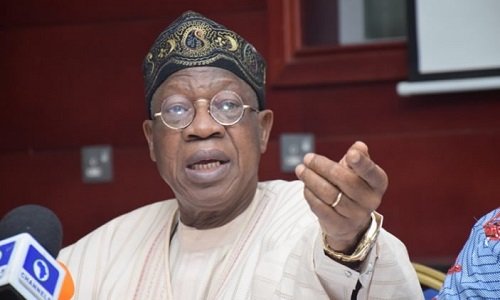Minister of Information and Culture, Lai Mohammed, has said that insecurity is the major challenge faced by the Federal Government in 2021.
Mohammed said this during a media briefing in Lagos, yesterday, to showcase the achievements of President Muhammadu Buhari’s administration during the outgoing year 2021.
According to him, despite the long list of achievements by Buhari’s regime, insecurity was a major challenge.
He, however, explained that the Armed Forces of Nigeria recorded some successes using a combination of kinetic and non-kinetic operations, coupled with a review of strategies.
This, he said, led to the neutralisation of over 1,000 terrorists, the rescue of 2,000 civilians and the surrender of over 22,000 terrorists, including their families in the North-East.
He noted that many arms and ammunition were also recovered, adding that several bomb-making factories of the terrorists were destroyed.
He said: “Let me admit straight away that the year has not been devoid of challenges. For the outgoing year, in particular, the major challenge has been that of insecurity. In spite of this and the usual economic challenges, especially the dwindling resources available to the government, the administration has availed itself creditably, as we will be demonstrating shortly.
“As I said in my introductory remarks, our biggest challenge in the outgoing year is in the area of security. Despite the enormity of the challenge, our military has continued to live up to its billing.
“We owe them a debt of gratitude for their patriotism and sacrifice. We just can’t appreciate them enough, as you will soon see when I break down their achievements in the year under review.”
Mohammed, who commended Buhari’s government for the tremendous progress made in 2021, said that in spite of daunting challenges in the course of the year, the administration made tremendous progress in the fight against insecurity, growing the economy and reforming the oil sector.
He added that the government succeeded in emplacing world-class infrastructure, as well as provided social safety net for the poor and the vulnerable in the society in the year under review.
He also attributed the effectiveness of the military to the supportive leadership provided by Buhari and the unwavering commitment of the armed forces and its leadership.
On the economy, he attributed its downturn on COVID-19, which impacted negatively on the world economy.
“Many countries around the world face unprecedented challenges starting from 2020 as a result of the COVID-19 pandemic, and Nigeria is no exception. The Nigerian economy was hit by the pandemic in mid-2020, and the economic disruptions led to a recession.
“The poor performance of the economy during the COVID-19 era affected output growth, trade, household welfare and livelihood,” he stated.
According to him, one of the greatest achievements of Buhari’s administration in the year under review was recorded in the oil and gas sector, with the passage and signing of the Petroleum Industry Act (PIA) as a landmark achievement.
Speaking on infrastructure, works and housing, Mohammed said that the present administration had distinguished itself in the provision of key infrastructure, such as housing, roads and bridges.

